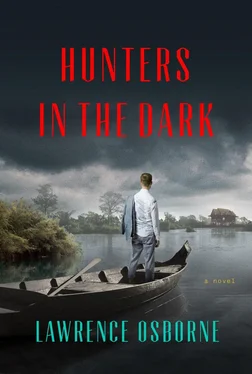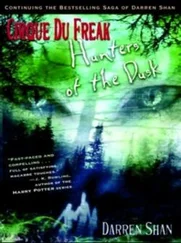He had to think this over since it had been such a theme in his own life. And it was at night that his memories came alive again and when he became aware that the ghosts of the murdered came alive as well and roamed across the land. It was known to everyone in the villages. His own past, too, was reenacted nightly in this way. He sometimes thought that in a demented way his past was very short, almost nonexistent. He had been a child in the sixties, in the happy time. But what did he remember of that?
The devious King Sihanouk in white and the music of Ros Sothea. The song called “Venus.” But the Angkar said it was all an illusion. There was no happiness then, it had all been a facade.
Later, it seemed that his life had begun with the Revolution and many men had said the same thing. Their lives began on April 17. It began then on that day, but when would it end? Where would his soul migrate to?
I’ll be an ant, he sometimes thought. I’ll be crushed by the heel of a schoolgirl on her way to school. I’ll be the size of a crushed seed.
“The blood debt must be paid with blood,” the Angkar used to say. “To show you mercy is no gain, to destroy you is no loss.”
Even before 1975, before he had become a kamabhipal for the Angkar, visions came to save and destroy him. They lay in the fields in terror when the B-52s came upon them. They avoided touching the ground with their faces so that the vibrations of the bombs would not give them nosebleeds. On the far horizons of those summer days the red dust rose in a wall to the height of half a mile. Beautiful, astonishing. Silent and somber beyond the cassava fields. It was like the oncoming of Vishnu, destroyer of worlds.
Through his village in the midst of these dust storms of bombs came the spindly boys in black with their weapons. The servants of the Angkar. So it had begun for him a long, long time ago, the eradication of his heart. Long before the war and the camps and the triumph of the Angkar. Life, then, was a mystery, but it was a cheap one. “We are all under one sky,” his father used to say, meaning that all suffer the same in the end. But it was not true.
When he became a kamabhipal he saw every day that the “old people” survived and the “new people,” the “April 17 people,” the doctors and the university people, the ministers even and their families, were crushed and dissolved with whips and their throats were cut with palm fronds. He worked for months at a secret camp in the forest, learning the new ways. He learned to lie under floorboards and listen to the conversations of villagers. The next day they could be denounced, dragged down to the river and cut apart with machetes. Their bodies went downriver.
Davuth was a peasant and so he had been one of the “old people.” His class were the builders of Angkor long ago, the salt of the earth, the wielders of threshers and fish traps. The ones whose faces were carved in stone a thousand years ago. People were not all under one sky.
The ghosts now walking quietly through the tobacco knew that better than anyone. The killers lived under a different sky. He looked up now and saw that the stars had reappeared and their glacial brilliance made him frown. It felt as if he could look right through them into the meaningless chasm beyond, and when he did he felt strangely reassured. It was not nothingness that instilled fear in him, it was the morbid idea that life had meaning after all.
Sophal watched the halo around the moon and she ran her hand along the curve of Robert’s spine and her thoughts moved back and forth like a comb moving through thick hair that it cannot disentangle. Hours passing in repetition, and there was no forward movement. She couldn’t sleep and the rain distracted her, it never seemed to give her a break. The streets slowly filling like saucepans, the rot beginning again and the men wading along them looking for small opportunities. But still the moon was there despite the clouds (there was no accounting for that) and she watched it drily, wondering if it would explode one fine night and finally leave her alone. The English boy slept like a miner. He slept like that but he never did any real work. Some part of her regretted her rashness in sleeping with him so quickly, but she had drunk too much too quickly and as the evening had progressed she had felt how lost and childish he was. But now she seemed to feel him more clearly. There was something also off-center about him, something spinning without wheels. She didn’t believe in his name, and his descriptions of his past did not quite ring true.
Did such things matter? No one ever knew much about another person. Charm was sometimes more than enough. She got up and went to the bathroom and for some strange reason began brushing her hair. Naked, she looked oily and burnished in the mirror, like something distant and far-off, and she could not recognize herself for a moment.
The previous year, she had been a medical student in Paris. Her father could imagine nothing better than her one day becoming a doctor like himself. A doctor with French qualifications. One night she had been called out to accompany a medical team who wanted her to go with them to the hard suburb of Kremlin-Bicêtre to unlock the apartment of a Khmer man who had gone missing seven years earlier. She went at three in the morning, the same rain. The social workers broke down the door and found a neat and orderly apartment, very Khmer in its tastes, and in the center of the small kitchen the caretaker from Takeo who had been made redundant in 2002, hanging by a gardening rope.
The electricity had been cut off and the place was cold and dark and the body, by some chemical miracle, was perfectly preserved. They held up torches and took notes and waited for the police to arrive and cut down the body. A lonely and unknown Khmer man of forty-three made redundant during a management restructuring. They knew his name. Chann Ong. His name meant “the moon.” The surname, Hokkien Chinese. He had killed himself and his body was discovered that night, seven years after the event. Her superstitious mind pondered it, though she said nothing to the Frenchwomen with her.
She touched the naked foot, like the foot of a mummy which has not lost its color entirely. They catalogued everything in the apartment. His twelve Buddhist books, his dusty toiletries, the old Pan Ron records. His bed had been made and the towels folded and left on it. A doll’s house for a dead man.
No one could explain how a cadaver could remain preserved for seven years. Before hanging himself Chann Ong had sealed all the windows tight and placed a towel under the door. So the room had been almost airless. No flies, no air, no bacteria? But still they could not explain it. She thought to herself, “It was his death wish,” and something in her stirred, she suddenly wanted to go home. It was not a feeling she had had before. They cut down the body and she felt like crying in front of all these quietly appalled French people, for how could they understand anything that had gone through Chann Ong’s mind as he sealed his death chamber and climbed that kitchen chair? It was not just the despair of losing his job and writing the dozens of angry letters to the management in order to receive desultory brush-offs. There was an anterior history, a shared history that was written upon the unconscious, and she understood it.
When she told her father this story he immediately asked her his age. Then he nodded and said that it was self-explanatory. Chann Ong was “one of us.” One of the people of Year Zero, the first year of the Revolution — or the April 17 people, as the unindoctrinated or “old people” were known.
It was brushing her hair in the Englishman’s mirror that made her think of Chann Ong and so he was not, then, entirely forgotten in his own land. Where was his ghost, then — here or there? Wandering the boulevards of Phnom Penh or those of Paris? She stood up straight and stared into her own eyes and remembered the crinkled soles of his feet and the certainty that it was a sign from the afterlife to her.
Читать дальше












